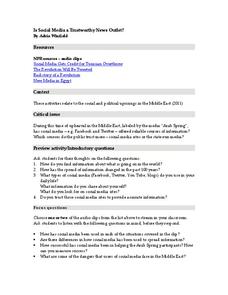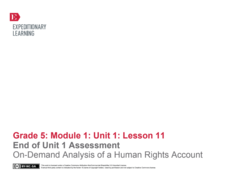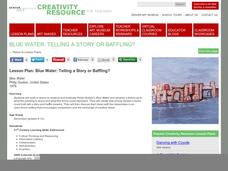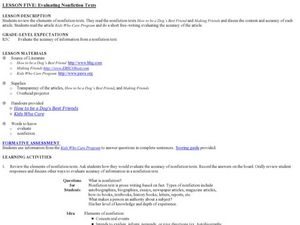Southern Poverty Law Center
Choosing Reliable Sources
It is more important than ever that 21st-century learners develop the skills they need to become savvy consumers of media. Young learners locate and identify reliable sources of information with a helpful media lesson.
Stanford University
Historical Thinking Chart
Narrow down your questions about author perspective, historical context, and veracity of claims in a document with the help of a historical reading chart. Learners track the basics of the document along with advanced evaluation skills...
Curated OER
Who is the Expert? Exploring Credible Sources in Healthcare
How do you decide what sources are credible when researching online? Evaluate sources with a focus on researching health issues. After brainstorming common health concerns and how they would try to diagnose these problems, class members...
Curated OER
Credible Sources on the Internet: What to Trust, What to Dismiss and When to Cite a Source
Wait, you mean researchers don't all use Wikipedia? Teach your class about intelligent research with a instructional activity about evaluating digital sources. The instructional activity starts with a quickwrite and includes vocabulary...
Curated OER
Is Social Media a Trustworthy News Outlet?
Examine the role of social media in social and political uprisings. Pupils listen to NPR audio clips about social media and the Arab Spring and read an article that proposes the idea that revolution will not happen through social media....
Southern Poverty Law Center
Analyzing How Words Communicate Bias
Words are powerful ... can your class choose them wisely? Scholars evaluate news articles to discover the concepts of tone, charge, and bias during a media literacy lesson. The resource focuses on recognizing implicit information and...
East Lyme Public Schools
To Declare or Not to Declare Independence?
Class members adopt the persona of real figures in American history, Patriots and Loyalists, research these individuals to determine their stance, and then debate the question of whether or not to declare independence from England.
Odell Education
Making Evidence-Based Claims: Grade 9
Sorry, Charlie. Scholars take a close look at Apology by Plato. Activities analyzing the text help pupils understand, make, organize, and write about claims. Learners work in groups, complete claim tools, and evaluate thinking by filling...
Newseum
Slanted Facts and Slippery Numbers
The Internet is known as the information superhighway, but sometimes it's hard to know when to hit the brakes on unreliable sources. Using a well-rounded lesson plan, pupils read and summarize articles about the gender pay gap and...
PBS
How to Teach Your Students about Fake News
What media literacy skills do people need to evaluate a news source? Scholars listen to and discuss an NPR story about how fake headlines often dupe young people and adults alike. Next, they study news stories, using a fact-checking...
Children’s Hospital of Philadelphia
Vaccine Safety
Enter the debate on vaccines. Small groups research topics related to vaccine safety in the last lesson in a unit of five. In the process of the research, team members learn how to determine the validity and credibility of a website. The...
University of Wisconsin
BEAM: Background, Exhibit, Argument, Method
Thinking of assigning a research paper? Get writers off on the right foot with a instructional activity that introduces the BEAM research model. Writers brainstorm the background of their topic, explicate the aspects of their topic,...
EngageNY
End of Unit 1 Assessment: On-Demand Analysis of a Human Rights Account
The last instructional activity in this unit about human rights consists of a final assessment. To demonstrate the skills your class has acquired throughout this unit, they will work with a new article entitled "From Kosovo to the United...
Facebook
Online Presence
What happens when an online post gets the wrong kind of attention? Learners evaluate the good, the bad, and the occasionally ugly side of social media posting with a instructional activity from a vast digital citizenship series. After...
University of Delaware
Constructing Text-Based Arguments About Social Issues
Eighth graders take a stand on a variety of controversial topics with a lesson on argumentative writing. As they view an informative presentation and work with collaborative groups, they decide which side of each argument they want to...
Columbus City Schools
Totally Tides
Surf's up, big kahunas! How do surfers know when the big waves will appear? They use science! Over the course of five days, dive in to the inner workings of tidal waves and learn to predict sea levels with the moon as your guide.
Newseum
Editorials and Opinion Articles
Reading the news is fun, and that's a fact! With the lesson plan, scholars differentiate between fact and opinion as they read editorial articles. They complete a worksheet to analyze the information before writing their own editorials...
Curated OER
An Animal Report
Third graders create reports in the fashion of small books. They write brief descriptions for a variety of topics and answering a variety of questions. They create a picture book for their individual animals. They utilize basic computer...
Curated OER
Cartoons in the Classroom: The Stimulus Package
A large pig labeled "Stimulus Package" wrapped in an American flag is the primary image on this political cartoon. Ready for analysis, this worksheet provides learners with the opportunity to understand the pros and cons of US spending...
Curated OER
Blue Water: Telling a Story or Baffling?
Some art can be difficult to interpret. Critical thinkers analyze the forms, techniques, purpose, and meaning found in the abstract piece, Blue Water. They engage in small group discussions in order to form a hypothesis as to the nature...
Curated OER
Performance Evaluation
Students evaluate in class performance of music previously prepared by the ensemble. The rubric and assessment criteria are adaptable to any orchestra setting which allows the teacher to choose music to be assessed. Critical thinking...
Curated OER
Cosmetic Products Evaluation
Students evaluate different cosmetic products. For this chemistry lesson, students determine the physical and chemical components of their samples. They perform various test such as pH, viscosity, conductivity and formulate a conclusion...
Curated OER
Critically Examining, Analyzing and Evaluating Picture Books on Aboriginal Canada
Students combat pervasive stereotypes. In this Critical Analysis lesson plan, students examine and evaluate the stereotypes of Aboriginal groups, as depicted in a picture book. Students will use primary and secondary sources to compose...
Curated OER
Evaluating Nonfiction Texts
Students evaluate nonfiction text. For this evaluating nonfiction lesson students read two pieces of nonfiction text and respond with a short free-writing piece. Students discuss the content and focus on the accuracy.

























